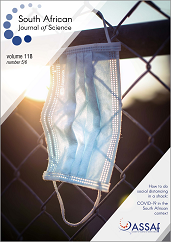Expert voices in South African mass media during the COVID-19 pandemic
DOI:
https://doi.org/10.17159/sajs.2022/12480Keywords:
science communication, gender imbalance, research field imbalance, public visibility, COVID-19Abstract
Scientists increasingly recognise that media visibility allows them to gain influence in public and policy spheres. However, some scientists shy away from publicity and journalists are purposefully selective when they seek out experts to interview. This may result in a skewed representation of scientists in the mass media. In this study, we explored which South African scientific experts at the academic rank of ‘professor’ were quoted in the local mass media during the initial 6 months of the COVID-19 pandemic. Our analysis of 1164 media articles related to COVID-19 showed that, as far as gender is concerned, men dominated as expert sources, with women accounting for only 30% of quoted professors. In terms of research field, most experts were from the broad field of health and medicine, with an under-representation of social scientists. We reflect on the implications and consequences of a skewed media representation of scientific expertise, as well as some of the options to remedy these imbalances.
Significance:
- This is the first study to identify the most visible science experts in the mass media in South Africa during the COVID-19 pandemic.
- We recommend options for institutions, researchers, media editors and journalists to help diversify expert sources that are featured or quoted in the mass media.
Published
Issue
Section
License

All articles are published under a Creative Commons Attribution 4.0 International Licence
Copyright is retained by the authors. Readers are welcome to reproduce, share and adapt the content without permission provided the source is attributed.
Disclaimer: The publisher and editors accept no responsibility for statements made by the authors
How to Cite
- Abstract 1893
- PDF 1272
- EPUB 587
- XML 542
Funding data
-
National Research Foundation
Grant numbers 93097 -
Department of Science and Innovation, South Africa
Grant numbers 93097












.png)